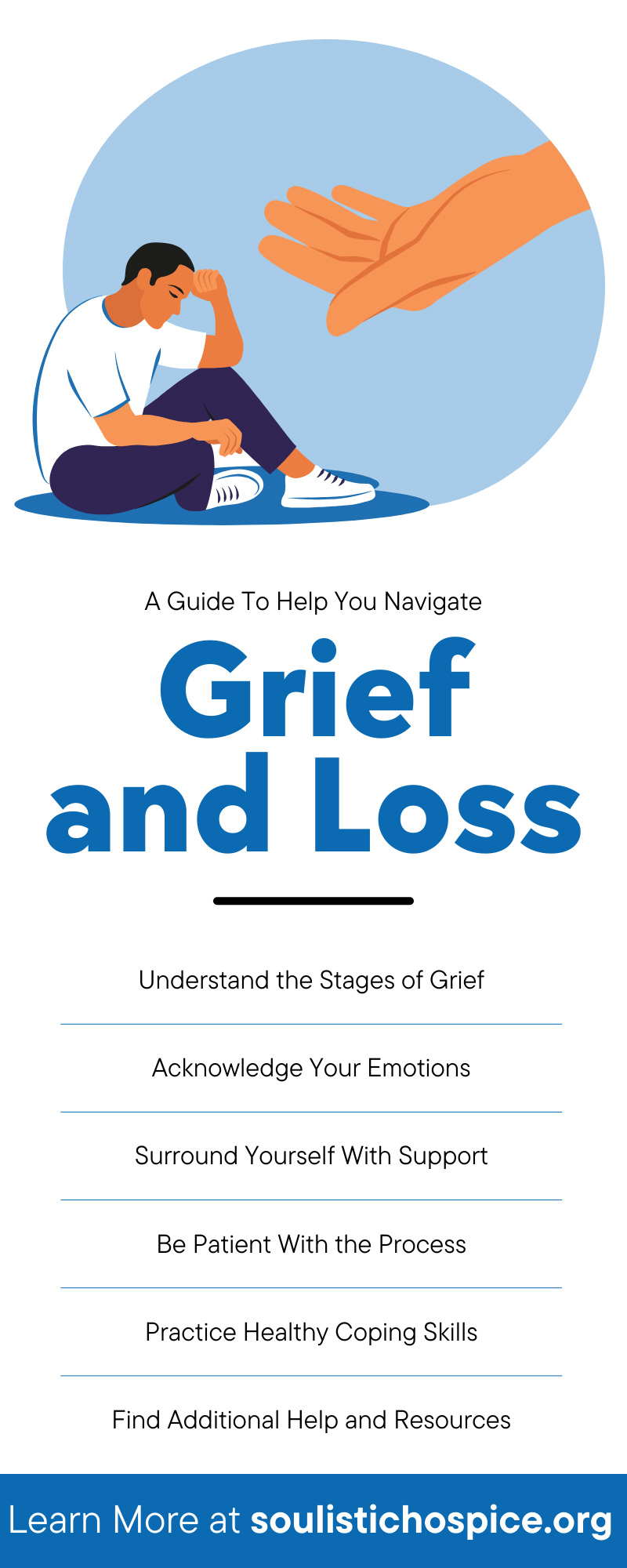
In the midst of the profound pain and loneliness that accompanies grief, it can often feel as though you’re navigating an unfamiliar landscape shrouded in darkness. This article aims to serve as a gentle lantern, casting some light upon your path and providing a guide to help you navigate grief and loss. We wish to reassure you that even in your deepest sorrow, you are not alone—hopefully, we can bring some understanding, comfort, and a glimmer of hope to your journey.
Understand the Stages of Grief
The journey through grief is not linear but rather a cyclical process characterized by different stages. Psychiatrist Elisabeth Kübler-Ross first proposed these stages of grief, which include denial, anger, bargaining, depression, and acceptance. It’s important to realize that these stages are not a rigid framework; everyone’s experience with grief is unique and may not follow this exact route. However, understanding these stages can be beneficial, providing a sort of roadmap for your grieving process. Recognizing the signs of each stage may help you better navigate your feelings and reactions and realize that each stage, no matter how intense or challenging, is normal.
Acknowledge Your Emotions
One of the most critical steps in navigating through grief is genuinely acknowledging your emotions. You may feel the need to suppress feelings of sadness, anger, or fear, especially during the early stages, as they can be overwhelmingly intense and painful. However, allowing yourself to experience these emotions, no matter how uncomfortable, can be an integral part of the healing process. Doing so enables you to confront the reality of your loss, gradually releasing the weight of your grief. It’s important to remember that it’s OK to feel and that every emotion is valid in the face of loss. By giving yourself permission to express and process your feelings, you can begin to understand and accept your grief, eventually fostering the resilience needed to move forward.
Surround Yourself With Support
A strong support network is crucial when navigating the turbulent waters of grief and loss. Surrounding yourself with family, friends, and other supportive individuals can serve as a lifeline, providing comfort, companionship, and understanding during your darkest moments. They can be there to listen when you need to express your feelings, provide a comforting presence when you feel alone, and offer words of reassurance when you’re grappling with doubts. The simple act of spending time with loved ones can help to alleviate feelings of isolation and loneliness.
Remember, it’s OK to lean on others for support. Accepting help and seeking comfort from your support network validates your feelings and aids in the healing process, fostering resilience and inspiring hope. It’s essential to understand that you don’t have to go through the grieving process alone—there are people who care about you and want to be there for you.
Be Patient With the Process
Grieving is a profoundly personal and highly individual experience; there’s no right or wrong way to grieve, and importantly, there’s no set timeframe for how long the process may take. Some start to feel better within weeks or months, while for many, the grieving process is easier to measure in years. Healing is a gradual process, and being patient with yourself during this time is essential. Do not rush yourself or let others rush you. Take time to mourn your loss, cry, feel numb, be angry, or feel however you need to.
Understand that you may have good days and difficult ones, and this is part of the process. Avoid setting unrealistic expectations about when you should “move on” or “get over” your loss. Remember, it’s OK to have setbacks—this doesn’t mean you’re not making progress, but rather that healing from loss is a journey with its own path and pace. Patience with the process allows you to fully experience and acknowledge your feelings rather than bypassing them, leading to a more authentic and enduring healing process.
Practice Healthy Coping Skills
Another crucial aspect of navigating grief and loss is to practice healthy coping skills and engage in self-care activities. During the grieving process, it can be easy to fall into unhealthy coping mechanisms, such as substance abuse or isolation, which can further exacerbate feelings of sadness and loneliness. It’s essential to recognize these patterns and instead choose positive, constructive methods to manage your grief. Such methods could involve engaging in physical activities such as walking, yoga, or other forms of exercise, which have proven benefits for mental health.
Other healthy outlets can include creative activities, such as painting, writing, or music, which provide an expressive outlet for your emotions. Regularly spending time in nature, practicing mindfulness or meditation, and ensuring a healthy diet and sleep routine are also beneficial. Remember, practicing self-care during this time is not a luxury but a necessity. By prioritizing your well-being and utilizing healthy coping mechanisms, you’re taking active steps toward healing and thriving in the face of grief.
Find Additional Help and Resources
At times, the journey through grief may seem too daunting to face alone, and additional help and resources can prove invaluable. Seeking professional support such as grief counseling or bereavement care can provide a safe, non-judgmental space to express your feelings and explore your grief more deeply. Trained professionals can guide you through your grief process, offering coping strategies and tools tailored to your unique needs and circumstances.
Meanwhile, joining a grief support group can foster a sense of community and shared understanding you may not find elsewhere. These groups consist of individuals who are also experiencing grief and loss, providing a platform for shared experiences, mutual support, and healing. Participation in such groups can help alleviate feelings of isolation, reminding you that you’re not alone in your grief journey. Remember, seeking help is not a sign of weakness but a testament to your strength and determination to heal.
Now that you have a complete guide to dealing with grief and loss, you can use these strategies today. Each person’s grief journey is unique and deeply personal. The steps outlined in this guide are not linear but instead are steps to revisit as needed, offering you a comprehensive toolkit for navigating the complexities of grief. Contact Soulistic Hospice if you’re looking for hospice bereavement services in the Tucson area. Never forget that even amidst the darkest times, there’s a community here to support you, resources available to help you, and a strength within you that can guide you through.









